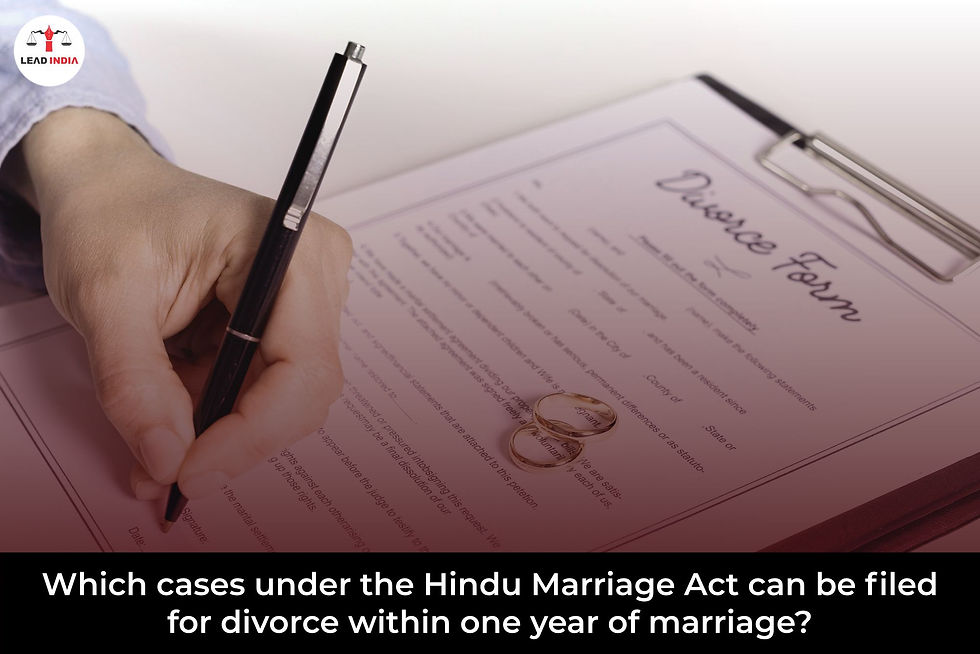Which Cases Under The Hindu Marriage Act Can Be Filed For Divorce Within One Year Of Marriage?
- Lead India
- Jun 20, 2023
- 3 min read
The Hindu Marriage Act allows for divorce on grounds of unhappiness or if the union cannot be upheld. Typically, a divorce petition can only be submitted after one year of marriage. In rare situations, such as when the petitioner is in danger or the respondent is mentally disturbed, a court may nevertheless allow a petition to be submitted earlier than one year from the date it is due. The filing of a divorce petition before the first year of marriage is prohibited by Section 14 of the Hindu Marriage Act, 1955.
The notion of a fair trial is established in Section 14, which stipulates that legal requirements that are advisory rather than prescriptive in nature might be regarded as having been complied with if there is sufficient, rather than complete, compliance with those legal provisions. Although Section 14(1) of the Hindu Marriage Act contains a non-obstante clause at the beginning (a non-obstante clause is added to a provision to support its enforceability over another provision that conflicts with it), the provision to that subsection alters the nature of the law's provision so that it is "directory" rather than "mandatory." As previously indicated, when a legal requirement is directive in character, what is to be observed is sufficient and/or sufficient compliance with the requirement, not strict conformity with the applicable legal requirement.
According to this section, a court cannot consider a divorce petition before the couple has been together for a year. The Marriage Laws (Amendment) Act, 1976, decreased the waiting period from three years from the date of marriage to one year. Prior to that act, no court could consider a divorce petition.
Court's discretion
The proviso gives the court latitude. In the interim, the court may permit the filing of such a petition while the case is still under consideration. The first question that would be raised is whether or not the circumstance qualifies as "exceptional depravity" or "exceptional hardship." The court may, in its own discretion, permit the petition to be brought if the matter falls within one of the aforementioned headings. The court has the authority to give or deny an ex parte order and to grant or deny leave under this section. If the court agrees to grant leave, it must first evaluate if there is a probability the parties will be able to work things out. Additionally, as stated in Section 14(2), the court must take the interests of any children of the marriage into account while deciding whether to issue leave.
All divorce applications must take the likelihood of reconciliation into consideration. The interests of the kid, if any, in the marriage should be taken into serious consideration. In the absence of significant unfairness, the application of an incorrect legal theory, or failure to consider a material circumstance, the appeal court will not intervene with the district court's discretion. The proviso is intended to alter the effect of the one-year restriction in exceptionally uncommon situations. It enables the court in these cases to take a petition for a divorce decree into consideration before the end of the statutory period.
Any regulations the High Court may adopt in this regard will govern the process for asking for special leave to submit such a petition. In the event that the respondent wishes to contest the divorce petition on the grounds that the leave for filing the petition has been improperly obtained or incorrectly granted, various courts have developed rules regarding the application for special leave under the Section, service of the order granting leave ex parte, and the subsequent procedure.
If the couple lives in Delhi, then a court marriage in Delhi may be done. Moreover, the court marriage process in Delhi should be followed, and a marriage certificate in Delhi should be issued.
Lead India delivers data, legal services, and free legal advice online to address the issue. Ask a legal question online and talk to a lawyer to receive the best advice in this situation
Visit us: — https://www.leadindia.law
Call Us: +91–8800788535
Email: care@leadindia.law
Facebook: — https://www.facebook.com/leadindialaw
LinkedIn: — https://www.linkedin.com/company/76353439
Twitter: — https://twitter.com/leadindialaw
Pinterest: — https://in.pinterest.com/lawleadindia
Instagram: - https://www.instagram.com/leadindialawofficial
Read Also:-







Comments